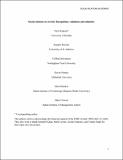Social relations in crowds : recognition, validation and solidarity
Abstract
Social identity research on crowds demonstrates how cognitive self-definition as a crowd member results in conformity to identity-relevant norms. Rather less research has addressed the social-relational changes within a crowd and how these impact collective experience positively. The present study investigates these processes at a month-long mass gathering in India. Analysis of 37 interviews with participants attending the annual Magh Mela pilgrimage evidences the concept of shared identity as underpinning their understanding of this mass gathering. Moreover, a theoretically derived thematic analysis of these interviews shows the value of the analytic concepts of recognition, validation, and solidarity in illuminating the ways in which social relations in the crowd were experienced and contributed to the experience of the event. Through exploring the multi-dimensional nature of relational connectedness in crowds we contribute to an understanding of crowd experience and group processes.
Citation
Hopkins , N , Reicher , S , Stevenson , C , Pandey , K , Shankar , S & Tewari , S 2019 , ' Social relations in crowds : recognition, validation and solidarity ' , European Journal of Social Psychology , vol. Early View . https://doi.org/10.1002/ejsp.2586
Publication
European Journal of Social Psychology
Status
Peer reviewed
ISSN
0046-2772Type
Journal article
Description
The authors wish to acknowledge the financial support of the ESRC (Grant # RES‐062‐23‐1449).Collections
Items in the St Andrews Research Repository are protected by copyright, with all rights reserved, unless otherwise indicated.

